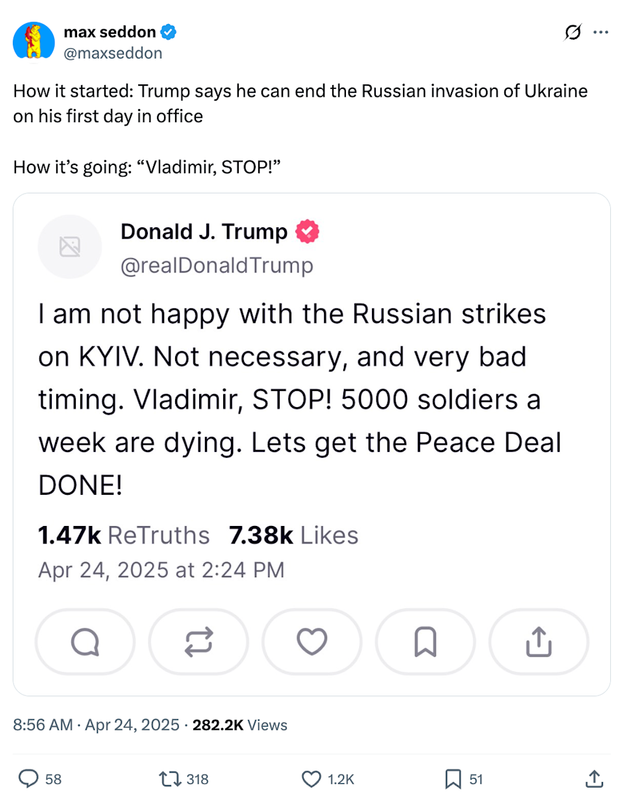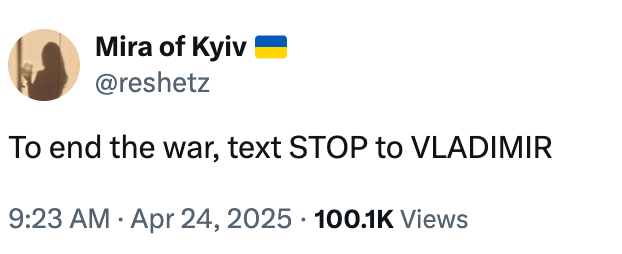Ukraine
-
US President Donald Trump’s phone call with his Russian counterpart, Vladimir Putin, didn’t take a tangible step towards ending the hostilities in Ukraine, let alone finding an enduring peace. Rather, it provided further evidence of Putin’s ability to string along and outsmart Trump.
For starters, Putin sent a signal by making Trump wait for more than an hour to talk. Putin was speaking at a televised conference with Russian businesspeople and even made a joke about the delay when told the time for his call was approaching.
This was clearly designed to show his alpha status, both to Trump and the Russian public. Steve Witkoff, Trump’s special envoy, was reportedly made to wait eight hours by Putin when he arrived in Moscow last week for talks.
-
Trump doesn’t seem to be in touch with US intelligence agencies.
Ukrainian soldiers in Kursk have lost ground in recent days but are not encircled by Russian forces, contrary to recent comments by U.S. President Donald Trump and Russian President Vladimir Putin, according to three U.S. and European officials familiar with their governments' intelligence assessments.
U.S. intelligence agencies, including the CIA, have shared that assessment with the White House over the past week, a U.S. official and another person familiar with the matter said. However, Trump has continued to claim that Ukrainian troops are surrounded in western Russia's Kursk region. -
US President Donald Trump’s phone call with his Russian counterpart, Vladimir Putin, didn’t take a tangible step towards ending the hostilities in Ukraine, let alone finding an enduring peace. Rather, it provided further evidence of Putin’s ability to string along and outsmart Trump.
For starters, Putin sent a signal by making Trump wait for more than an hour to talk. Putin was speaking at a televised conference with Russian businesspeople and even made a joke about the delay when told the time for his call was approaching.
This was clearly designed to show his alpha status, both to Trump and the Russian public. Steve Witkoff, Trump’s special envoy, was reportedly made to wait eight hours by Putin when he arrived in Moscow last week for talks.
-
China Considering Sending Peacekeepers to Ukraine, German Media Say
-
Trump envoy relied on Kremlin interpreter in meetings with Putin to end war in Ukraine
Using the Kremlin’s interpreter was “a very bad idea” that put Witkoff “at a real disadvantage,” Michael McFaul, a former U.S. ambassador to Russia, told NBC News.
-
Zelensky, European leaders tell Trump they are ready for 30-day ceasefire
https://www.axios.com/2025/05/10/trump-russia-ukraine-ceasefire-zelensky-putin
-
My Ukrainian student mentioned today that things are very much up in the air for her family right now. I was catching up on news and got some details:
Washington plans to spend about $250 million of foreign aid funds to repatriate people from active conflict zones, including about 200,000 Ukrainians and 500,000 Haitians, the Washington Post reported on May 20, citing the draft internal documents the newspaper obtained.
During Joe Biden's presidency, Ukrainians and Haitians were granted temporary protection, allowing them to stay in the U.S. if they could not return to their home country.
With the Trump administration coming to office, the U.S. has tightened its immigration policy. U.S. President Donald Trump previously pledged to impose harsher legislation on migrants and launch the "largest deportation program in U.S. history," aimed at removing 15 to 20 million migrants from the country.
According to the draft internal documents, the proposal was prepared after the Department of Homeland Security issued a statement on May 5. The statement read that those immigrants who voluntarily leave the U.S. for their home countries would be eligible for $1,000 in assistance.
Besides Ukrainians and Haitians, the draft documents also mention Afghans, Palestinians, Libyans, Sudanese, Syrians, and Yemenis, who could become other targets of the deportation program, the WP reported.
-
Trump having a Biden moment?
Behind the scenes: When the call with Putin ended, Trump called Zelensky again. This time the leaders of Germany, France, Italy, Finland and the European Commission were also on the line.
"The second call was longer and of a different character than the first one," Zelensky said later.
While a European source on the call told Axios it was "constructive," another source said Zelensky felt it was "bad."
Trump told the leaders that Putin agreed to start direct negotiations on a ceasefire immediately. A source on the call said there were a few seconds of puzzled silence.Zelensky then pointed out that Putin had previously agreed to negotiate, and the first round of ceasefire talks took place on Friday in Istanbul. Trump didn't directly respond, the sources said.
The sources said Zelensky and several other leaders on the call told Trump it had been his idea to start the peace talks with an immediate 30-day ceasefire.
A White House official told Axios Trump "never agreed" that a ceasefire should be a prerequisite for negotiations and never said Zelensky can decide what the conditions for negotiations will be.More on the call with the EU and Zelensky:
https://www.axios.com/2025/05/20/trump-putin-call-european-leaders-zelensky
-
European Officials Say Trump Tells Their Leaders Putin Isn’t Ready to End Warr
WSJ:
-
Former U.S. Ambassador to Ukraine John Herbst, in an interview with NV’s Nataliia Rop, explains why Donald Trump blames his predecessor for the war, how his sympathy for Vladimir Putin took shape, and what could eventually push him to put real pressure on Russia.
-
This was in my news feed.
Zelensky: Ukraine agrees deals for 'hundreds of thousands' of drones


